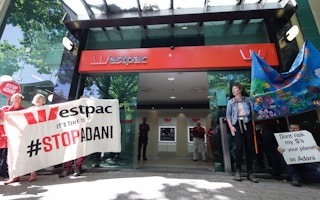In Australia, as in the America’s Trumpocene, the histrionics of politics can have a blinding effect. The noise, tension and intrigue can so engross — and take up air time — that important events are being hidden in plain sight.
To continue reading, subscribe to Eco‑Business.
There's something for everyone. We offer a range of subscription plans.
- Access our stories and receive our Insights Weekly newsletter with the free EB Member plan.
- Unlock unlimited access to our content and archive with EB Circle.
- Publish your content with EB Premium.
This was the case last Friday, when in a quiet speech to a group of insurers, a monumental shift took place that will arguably have more impact on Australia’s response to climate change than any decision made in Parliament this year.
While the country’s elected leaders have embarrassingly been waving coal around on the floor of Parliament and arguing the merits of a paradox like clean coal, the leading regulatory body of Australia’s financial services made clear that there is no question about the threat posed by climate change. And that threat is likely to come in the form of legal challenges.
The Australian Prudential Regulation Authority (APRA) oversees and regulates Australia’s banks, our insurance companies, and superannuation funds, as well as our credit unions and building societies.
While federal politicians continued to ignore the risks posed by climate change — despite record heatwave conditions in four states over the last two weeks — APRA has cut through with its directness.
Speaking at the annual APRA forum last Friday, Executive Board Member, Geoff Summerhayes, outlined not a moral case, but a purely evidence-based reason for taking swift and bold action.
“I think the days of viewing climate change within a purely ethical, environmental or long-term frame have passed. More and more, the conversations we are having are about the practical realities and consequences of a changing climate,” Summerhayes told the crowd.
Western governments, led by the axis of the inept – Prime Minister Turnbull and President Trump – may be slow to pick up on the seismic shift that happened after the Paris Agreement in 2015. But business is certainly picking up the slack.
APRA understands the risks of not taking action on climate, and see it as an imperative to create a regulatory culture where the risks of not acting are too great to be ignored. Indeed, Summerhayes sees the financial and insurance sectors as key players in combatting climate change.
“Addressing climate change is still a lofty goal… [but] we’re now at the stage of the collective effort, calibration and creativity to turn ambition into reality. What happens next isn’t just a matter for rocket scientists – but also humble prudential regulators,” he said.
Leading his announcement on Friday is his belief that inevitably company directors will be held personally liable if they don’t consider the climate impacts of their decisions.
Can you imagine the impact this will have on the decision making process of banks when they consider funding, say, a new coal mine or gas field?
How many directors want to be potentially jailed as climate villains for breaching their statutory duty of due care and diligence under the Corporations Act? I wager close to none.
And without funding from one of Australia’s ‘Big Four Banks’, new fossil fuel projects stand basically no chance of getting up.
Indeed, there has not been a major fossil fuel project in Australia that has gone ahead without funding from the Big Four. Since 2008, they have collectively loaned more than $70 billion to dirty coal, oil and gas projects.
But, as the government pushes for the oxymoron idea of “clean” coal power stations, who is going to loan to these projects if the boards of lenders can be held personally responsible?
The APRA speech couldn’t come at a worse time for bank Westpac. Formerly known as the world’s most sustainable business, the bank is currently facing pressure from activists around the country for its refusal to rule out funding for the Adani mega coal project.
“
While the country’s elected leaders have embarrassingly been waving coal around on the floor of Parliament and arguing the merits of a paradox like clean coal, the leading regulatory body of Australia’s financial services made clear that there is no question about the threat posed by climate change.
We know that if there is any chance of keeping global warming to less than 2C and avoiding devastating climate change – and the associated sea level rises, severe weather events and drought, as well as bushfires – we cannot open up any more new polluting coal, oil or gas projects and must actually leave much of the current reserves in the ground.
It is this two degree limit that world leaders agreed would be the safe limit at the Paris Climate talks. It was heartening to see the Big Four Banks agree to align their loan books with a two degree world. But despite these bold words, the banks have continued to fund fossil fuels. For example, since making their two degree commitment, Westpac has handed over another $900 million to fossil fuel projects.
Moreover, many of the fossil fuel projects that Westpac has funded are for new expansions of the fossil fuel industry. As APRA has pointed out, not only is this recklessly increasing the risk of climate change, it is also exposing the bank to the risk of “stranded assets” and, now, possible challenges based on fiduciary duty.
Now activists are taking issue with Westpac’s refusal to rule out funding for what would be the largest coal mine in Australia’s history — a project that flies in the face of what was achieved in Paris and that could, single handedly tip the global carbon budget if run at capacity.
The bank has previously loaned $643 million to Adani for the purchase of the existing coal terminal at Abbot Point, on the shores of the Great Barrier Reef.
How much is Westpac willing to gamble on this dangerous project?
Not surprisingly, environmental activists are planning to hold rolling protests against Westpac until it rules out the Adani project. This is on top of efforts to encourage customers to divest their accounts, home loans and credit cards away from the bank – financial products that, once gone, will have a real impact on the bank’s bottom line — on the basis of the bank’s ongoing involvement with fossil fuel projects.
But perhaps these actions, combined with the prospect of personal liability will finally convince CEO, Brian Hartzer, to abandon this ludicrous project.
As the brazen, publicity hungry politicians continue to play games with our future rather than providing leadership on this critical issue impacting not just our climate but energy, jobs and our role in the low carbon world, the humble regulators have spoken.
Blair Palese is chief executive officer, 350.org Australia. This article was written exclusively for Eco-Business.


















